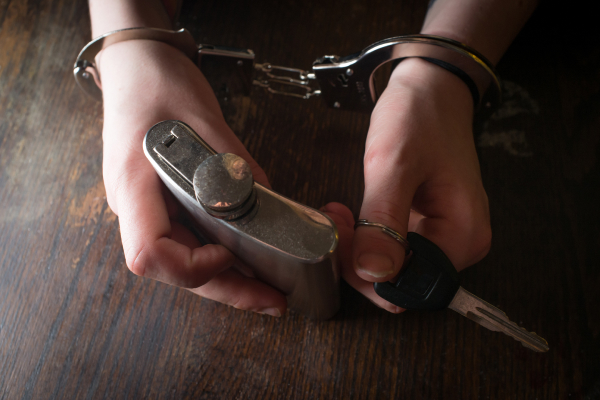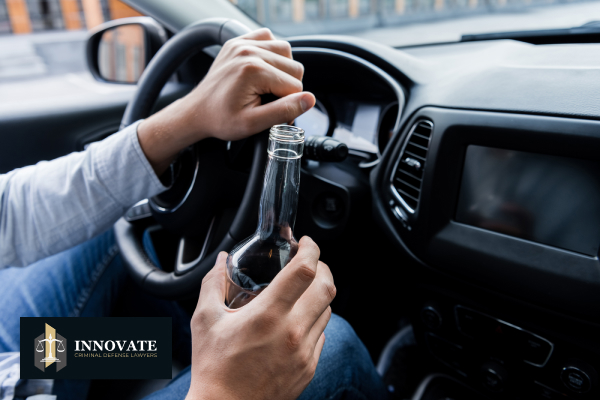
You may be curious about what happens when you get a DUI, and it's natural. No one wants to be arrested, right? But when the unavoidable happens, and you get arrested for a DUI, it feels like the world is crashing down around you. You may worry about your future and job and how this will affect your family.
Being arrested for a DUI can have severe penalties, potentially resulting in jail time, losing your driver's license, and other serious consequences.
But knowing the process can help reduce some of that stress. It's important to know what to expect, from the initial stop by law enforcement to possible court appearances.
A DUI arrest begins with being pulled over by a law enforcement officer and potentially facing field sobriety tests.
If you fail these tests, the next steps involve being booked at the police station and facing charges. Learn more about DUI charges below. Then, contact our team at Innovate Criminal Defense Lawyers for a free consultation.
In Maryland, driving under the influence (DUI) means operating a motor vehicle with a blood alcohol concentration (BAC) of 0.08% or higher. This is known as the legal limit. A DUI arrest triggers an automatic license suspension in many states.
But you can still face charges for driving while impaired (DWI) at lower BAC levels if your driving ability is compromised. The law is strict because drunk driving poses a severe risk to public safety.
Maryland law also considers the use of drugs while driving as a DUI offense. This includes prescription medications that impair your ability to drive. Even if your BAC is under the limit, evidence of impairment can lead to a DUI charge.

A DUI stop typically begins when law enforcement officers notice signs of impaired driving. This can be stressful, knowing it could lead to an arrest. Police officers are taught to look for specific indicators of intoxication or drug use. The goal is to ensure roads are safe for everyone.
Field sobriety tests are meant to review your physical and cognitive functions. Officers might ask you to walk in a straight line or stand on one leg.
Failing these tests can lead to further investigation. A breathalyzer test measures your BAC and is important evidence in DUI cases.
Officers are required to follow key steps when giving these tests. The goal is to ensure the tests are fair and accurate. Refusing a breathalyzer test can trigger major consequences, including automatic license suspension.
After a DUI arrest, the police will take you to the station for booking. This process involves recording your personal information and the details of the alleged offense. It's a formal step in charging you with a DUI. Knowing what to expect can make this daunting process slightly less intimidating.
Booking includes taking your fingerprints and photograph and providing basic personal information. This is standard procedure and marks the beginning of the formal legal process.
Depending on the circumstances, you may be held in custody or released until your court date. Officers will also inventory your personal belongings at the time of arrest. You'll receive a receipt for these items, which you can reclaim later.
Awareness of this process is important for anyone facing a DUI charge. It's the first step in a journey through the legal system.
Once you're booked, the prosecutor will review the case to decide on formal charges. They consider the evidence, including breathalyzer results and field sobriety tests. This decision can highly impact your case.
A skilled DUI defense lawyer can argue against the evidence, potentially leading to reduced charges or even dismissal. The prosecutor's job is to prove you were driving under the influence. They'll prepare a case to present in court.
However, with the right legal defense, it's possible to challenge their evidence. Being aware of the role of the prosecutor helps you see the importance of having a strong defense.

A DUI arrest comes with immediate administrative consequences. One of the first things affected is your driving privileges. The Maryland Motor Vehicle Administration (MVA) takes action separate from any criminal proceedings. This can include suspending your driver's license.
Right after an arrest, you may face a temporary license suspension. This is meant to prevent further harm while your case is pending. It's a precautionary measure that impacts your ability to drive. Knowing this can help you prepare for the challenges ahead.
An arrest for alcohol automatically triggers a process within the Department of Motor Vehicles (DMV) that can result in a suspension of your driver's license.
You have the right to request a hearing with the MVA to challenge your license suspension. This hearing is different from your criminal case but is equally important. A successful challenge can mean keeping your driving privileges while your DUI case proceeds.
You might face a longer suspension of your driver's license if the hearing doesn't go in your favor. The duration of the suspension hinges on factors like your BAC level and whether you have prior convictions. Knowing this process is necessary for anyone facing a DUI charge.
Pre-trial motions are a vital part of the defense strategy. They allow your attorney to challenge the prosecution's evidence before the trial begins. Success can mean the exclusion of damaging evidence or even the dismissal of charges.
Requesting a DMV hearing is critical to protecting your rights and can significantly impact your ability to maintain your lifestyle while your case is pending. Your DUI defense lawyer will handle the request and prepare for the hearing to achieve the best possible outcome for you.
Your attorney might argue that evidence was obtained illegally or violated your rights during the arrest. These arguments can weaken the prosecution's case. It's important to have a knowledgeable DUI defense lawyer who understands how to leverage these motions.

The penalties for a DUI conviction in Maryland can be severe. They might include fines, jail time, and mandatory participation in an alcohol education program.
The severity of the penalties often depends on factors like your BAC level and whether it's a first offense. You may retain your driving privileges after a first-offense DUI, but you might be required to use an ignition interlock device.
Repeat offenders face harsher penalties. This can include longer jail sentences and higher fines. A DUI conviction can also have long-term impacts on your life, affecting employment opportunities and insurance rates. Understanding the potential penalties can motivate you to seek the best possible defense.

Facing a DUI charge is a critical and stressful situation that can have far-reaching consequences on your life. But you don't have to go through this challenging time alone. Innovate Criminal Defense Lawyers are here to protect your rights throughout the process.
A felony DUI is serious, but even a misdemeanor drunk driving conviction can change your life forever. Let our DUI defense attorney provide you with a strong defense. Contact our DUI defense attorneys today to schedule a free consultation.